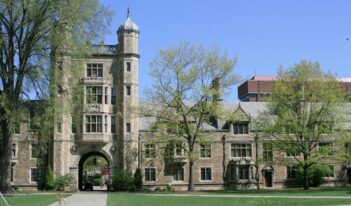
The Trump Administration may challenge the American Bar Association’s role in accrediting law schools.
On February 14, the new chair of the Federal Trade Commission, Andrew N. Ferguson, announced that political appointees employed by the Commission can no longer be members of the American Bar Association (ABA) and that the Commission will no longer support any employee’s membership in the ABA. The ABA’s position on many major issues is inconsistent with the agenda of the Trump Administration.
At least part of the difference in the views of the ABA and the Trump Administration is attributable to the Trump Administration’s strong distaste for diversity, equity, and inclusion (DEI) initiatives. ABA Accreditation Standard 206 initially included many references to the duty of law schools to implement DEI programs. In its 2023 decision in Students for Fair Admissions v. Harvard, the U.S. Supreme Court held that the Fourteenth Amendment and the Civil Rights Act of 1964 forbid public and federally funded universities, respectively, from using race-based preferences in their admission programs to achieve diversity.
Shortly after the Supreme Court issued its opinion in Students for Fair Admissions, Republican state attorneys general urged the ABA to eliminate or change Standard 206. They argued that it clearly conflicted with the Supreme Court’s decision. The ABA proposed amendments to Standard 206 that would eliminate all references to DEI, among many other changes. The ABA takes the position that its proposed new Standard complies with the Supreme Court’s opinion.
In January, however, 21 Republican state attorneys general wrote a letter to the ABA in which they disagreed with the ABA. They expressed appreciation for the changes that the ABA made in response to some of their complaints but asserted that the proposed new Standard is also illegal: “Yet, in several respects Standard 206 expressly and impermissibly calls on schools to calibrate classes and faculty based on race.” It will be interesting to see how the ABA’s governing body responds to this growing conflict when it meets on February 21, 2025.
The FTC action may be just the first step in a Trump Administration effort to strip the ABA of its power. Some of the other likely steps are easy to identify. The U.S. Department of Education supervises all post-secondary educational accreditation organizations. It is also required by law to publish an annual list of all nationally recognized accreditation organizations. The ABA may not appear on that list next year.
Part of the ABA’s power comes from the requirement in most states that an applicant for the state bar must be a graduate of an ABA-accredited law school. No one can practice law in a state unless they are a member of the state’s bar. Unless the ABA changes its position on issues such as the appropriate role of race in legal education, legislatures in Republican-controlled states are likely to amend their statutes that determine eligibility for the bar to eliminate any reference to graduation from an ABA-accredited school.
One critically important step in this process is not yet clear. What organization will the Trump Education Department and Republican-controlled states substitute for the ABA as the government-recognized accrediting organization for law schools? There is no heir apparent to the ABA on the right. The Trump Administration may initiate efforts to create an organization with views that are more compatible with its views that it will then designate as the nationally recognized organization to accredit law schools. Legislatures in Republican-controlled states would then substitute that organization for the ABA in their statutes that determine eligibility to be a member of their state bars.
If the Trump Education Department substitutes the new organization for the ABA in the list of nationally recognized accrediting organizations and Republican-controlled states substitute the new organization for the ABA in their state statutes, legislatures in Democrat-controlled states will have to decide how to respond.
If they retain the requirement that an applicant for their state bars must be a graduate of an ABA- accredited law school, the United States will have taken another big step in the direction of extreme political polarity, enormous regional variations in legal environments, and significant obstacles to interstate activities of all kinds. If they join the Republican states in substituting the new organization for the ABA in their statutes that determine eligibility for membership in their state bars, the United States will have taken another big step in the direction of creating an authoritarian government.




